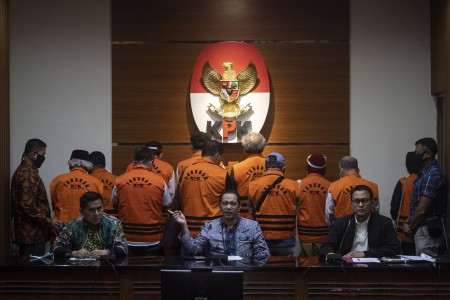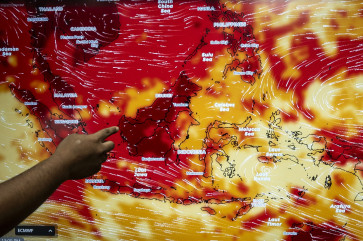New regulation clarifies KPK supervision of police, AGO
“With the new regulation, there’s no reason for [the police and the Attorney General’s Office] not to cooperate with the KPK," commissioner Nawawi Pomolango said.
Change Size

A
recently issued presidential regulation (Perpres) will allow the Corruption Eradication Commission (KPK) to more easily supervise and take over graft cases from the National Police and the Attorney General’s Office (AGO).
The regulation, signed by President Joko “Jokowi” Widodo on Oct. 20, details how the KPK is to monitor and review the progress of investigations conducted by the other two law enforcement bodies. It was issued as an implementing regulation of the 2019 KPK Law, which grants the commission the power to supervise and take over cases but does not explain how it will do so.
The KPK expects the new regulation to improve coordination among the three institutions and help expedite investigations and prosecutions in the country.
The Perpres stipulates that the KPK can regularly request reports from the police and the AGO on the progress of investigations and, whenever necessary, review their progress.
The KPK can elect to meet with the two institutions regarding ongoing cases and can give recommendations on how to expedite the investigations or opt to take them over entirely.
If the KPK decides to take over a case, the police or the AGO must send the case files and evidence to the KPK no later than 14 days after both sides sign a formal handover document, the regulation says, in line with the prevailing law. Any suspects in detention are to be moved to the KPK’s custody.
“With the new regulation, we can improve our supervision of graft cases handled by the AGO and the police,” KPK commissioner Nawawi Pomolango told The Jakarta Post on Friday, adding that the commission’s past supervision had “not been optimal”.
According to the prevailing law, the antigraft body is allowed to take over graft cases from other law enforcement agencies if it finds the investigation has been delayed without any clear justification. The KPK can also involve itself in a graft case if other parties intervene in the investigation or if there are indications of a cover-up.
Since its establishment in late 2003, the KPK has had the authority to supervise, evaluate and take over graft investigations conducted by the police and the AGO. That authority, stipulated by the KPK law, seeks to ensure efficient and effective graft investigations.
According to KPK data, the agency supervised 402 graft cases handled by the police and the AGO in 2019 and took over zero cases last year.
But Nawawi noted that it had often been difficult for the KPK to monitor the progress of cases because of the lack of detail in the law.
The AGO had even brought cases to corruption court without notifying the KPK, he added, even though the law mandated the coordination of prosecution.
This lack of legal clarity led to a months-long tug-of-war between the KPK and the police in 2012 as the two institutions fought to handle a graft case involving then-police traffic corps head Insp. Gen. Djoko Susilo and the procurement of a driving simulator. The standoff ended when the KPK insisted on bringing Djoko to court. He was sentenced to 10 years in jail in late 2013.
“Now, with the new regulation, there’s no reason for the two institutions not to cooperate with the KPK," Nawawi said.
Zaenur Rohman from the Gadjah Mada University Center for Anticorruption Studies (Pukat UGM), however, suspected the new regulation was a government intervention that could threaten the KPK’s independence.
He said details about the function of the KPK should be established by laws, which were discussed by both the government and lawmakers.
“The KPK is an independent body, so all of its duties and functions should have been detailed in the KPK law, not in a presidential regulation,” Zaenur said.
Wawan Suyatmiko from Transparency International Indonesia (TII) said the regulation would have no significant impact on the country’s anticorruption campaign if the KPK did not use it to take over high-profile graft cases or those involving potential conflicts of interest.
One recent example is an ongoing AGO investigation into alleged bribery involving its own prosecutor, Pinangki Sirna Malasari. Investigators arrested her in August for allegedly accepting US$500,000 in bribes from graft convict Djoko Tjandra in exchange for conspiring to secure his acquittal by the Supreme Court.
Antigraft activists have repeatedly urged the KPK to take over the case because the AGO has moved slowly throughout the legal process. Pinangki is currently on trial.
Although the new regulation is in place, Nawawi said the commission would not rush to take over graft cases from the police or the AGO.
“We will focus on tightening our supervision of both law enforcement bodies. We will consider taking over their cases only as a last resort in a bid to resolve the graft cases they handle,” he said.









